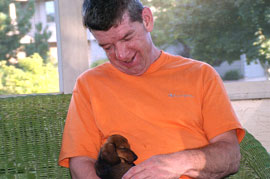FAQs

WHAT IS A HEAD INJURY?
The term HEAD INJURY refers to an injury to the BRAIN which is usually the result of an accident, or sometimes an assault. Often the injury results from a blow to the head such as may be suffered in an automobile accident, a fall or a gunshot wound. The injury may also occur as a result of lack of oxygen (such as in drowning), or as a result of lack of blood supply to the brain (such as following a cardiac arrest). People with multiple injuries (as in serious auto accidents) often suffer brain injury by more than one of these mechanisms. The term HEAD INJURY is preferable to the term BRAIN DAMAGE because the brain has tremendous powers of recovery.
WHEN DOES REHABILITATION BEGIN?
Rehabilitation is the process of helping a person achieve his/her maximum functional potential. This process begins immediately. Once memory of the events of the day begins to be restored, the rate of recovery often appears to be much more rapid. However, many problems may persist for a long time. These may be problems related to movement, memory, attention, slowness of thinking, difficulty with complex thinking, difficulties with speech and language, behavior problems and personality changes. These problems are dealt with in the rehabilitation of the head injured person. It should be pointed out, however, that rehabilitation begins much earlier than this. Some aspects of rehabilitation begin even while the head injured person is in coma.
WHEN DOES RECOVERY STOP?
Gradual recovery from head injury may continue from several years. Recently some dramatic improvements have been achieved by intensive retraining of people who have regained normal intelligence but are severely handicapped by specific problems in thinking, behavior, and in social and vocational skills. It is important to note, however, that recovery may stop at any stage. In the worst cases people may survive for years, totally dependent, and with no awareness of their surroundings.
DOES THE BRAIN HEAL ITSELF?
Injured brain tissue can recover over a short period of time. However, once brain tissue is dead or destroyed, there is no evidence that new brain cells can regrow. The process of recovery usually continues even though new cells do not grow. We presume this happens as other parts of the brain take over the function of the destroyed brain tissue. Obviously, the more extensive the damage, the less likely it is that the remaining brain can take over the function of the destroyed areas.
 Mankind
Mankind 